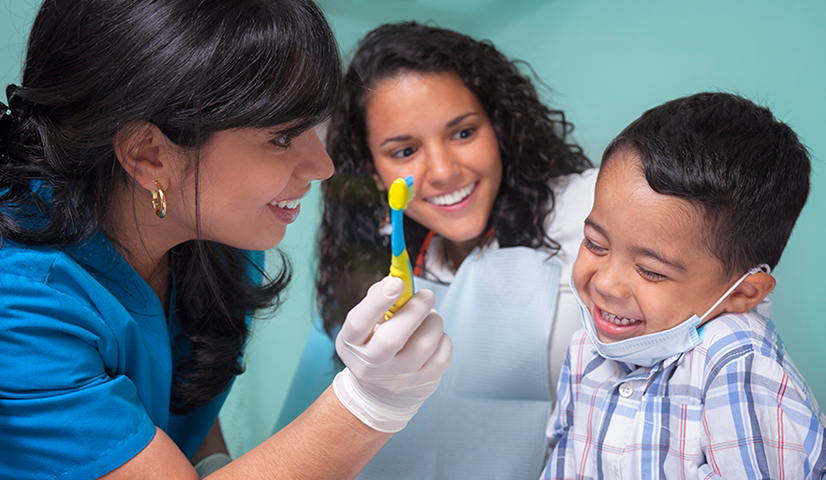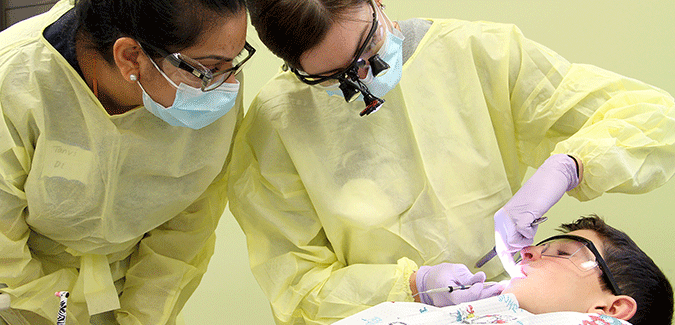In the field of pediatric dentistry, dental care is provided to children from the time of their birth all the way through their adolescence. Pediatric dentists not only focus on promoting dental health in children but also serve as a valuable resource for parents. It is recommended for children to have their first dental visit either after the eruption of their first tooth or by their first birthday. This early examination is crucial as it helps detect tooth decay in its initial stages. To become a pediatric dentist, specialized training is required through a postgraduate residency program following completion of dental school. These dentists have various responsibilities such as diagnosing and treating oral diseases, monitoring dental development, performing surgical procedures, and offering emergency dental care. The career outlook for pediatric dentists is quite promising, as there is a projected growth of 20% in job demand from 2014 to 2024.

Overview of Pediatric Dentistry
Pediatric dentistry is a branch of dentistry that focuses on providing dental care to children from birth through adolescence. It is a specialized field that requires additional training to address the unique oral health needs of children. Pediatric dentists play a crucial role in promoting dental health in children and serving as a resource for parents.
Definition of pediatric dentistry
Pediatric dentistry can be defined as the branch of dentistry that specializes in the oral health care of children. It encompasses a wide range of services, including preventive, diagnostic, and therapeutic procedures. Pediatric dentists are experienced in managing the oral health needs of infants, children, and adolescents, and are trained to recognize and address dental issues specific to this age group.
Importance of pediatric dentistry
Pediatric dentistry is important for several reasons. First and foremost, it helps to ensure that children develop and maintain healthy teeth and gums. By promoting good oral hygiene habits and providing preventive dental care, pediatric dentists can help prevent dental problems in children. Additionally, pediatric dentists are skilled in managing behavior and alleviating dental anxiety in young patients, creating a positive and stress-free dental experience.
Role of pediatric dentists
Pediatric dentists play a vital role in the oral health care of children. They provide comprehensive dental care tailored to the specific needs of each child, from infancy through adolescence. Their job responsibilities include diagnosing and treating oral diseases, monitoring dental development, performing surgical procedures, and providing emergency dental care. Pediatric dentists also serve as educators, offering guidance and support to parents on important topics such as proper oral hygiene, nutrition, and the prevention of dental issues.
First Dental Visit
The first dental visit is a significant milestone in a child’s oral health journey. It is recommended that children have their first dental visit after the presence of their first tooth or by their first birthday. This early dental examination is essential for several reasons.
Recommended timing for the first dental visit
The American Academy of Pediatric Dentistry recommends that children visit a pediatric dentist within six months of the eruption of their first tooth, and no later than their first birthday. This early timing allows the dentist to monitor the child’s oral health from an early age and address any potential problems before they become more serious.
Importance of early dental examination
An early dental examination is crucial for the early detection and prevention of dental issues. During the first dental visit, the pediatric dentist will thoroughly examine the child’s teeth, gums, and overall oral health. This examination helps identify any signs of tooth decay, gum disease, or other oral health concerns. Early detection enables prompt treatment, which can help prevent further complications and ensure optimal oral health as the child grows.
What to expect during the first dental visit
During the first dental visit, the pediatric dentist will take the time to get to know the child and establish a comfortable and trusting relationship. They will assess the child’s oral health and perform a gentle examination. The dentist may also provide guidance on proper oral hygiene techniques and offer advice on nutrition and diet for optimal oral health. This initial visit is an opportunity for parents to ask questions and address any concerns they may have about their child’s oral health.
Services Provided by Pediatric Dentists
Pediatric dentists offer a wide range of services to meet the unique dental needs of children. These services encompass preventive, diagnostic, and therapeutic procedures. Some of the key services provided by pediatric dentists include:
Diagnosis and treatment of oral diseases
Pediatric dentists are trained to diagnose and treat a variety of oral diseases in children. They can detect and manage conditions such as tooth decay, gum disease, oral infections, and developmental abnormalities. By providing timely and appropriate treatment, pediatric dentists help preserve the oral health of young patients and prevent the progression of these diseases.
Monitoring dental development
Monitoring dental development is an important aspect of pediatric dentistry. Pediatric dentists track the growth and development of the child’s teeth and jaws, ensuring that they are developing properly. They can identify and address any issues such as delayed eruption, crowding, or misalignment of teeth. By monitoring dental development, pediatric dentists can intervene early to prevent more serious orthodontic problems in the future.
Preventive dental care
Preventive dental care is a key focus of pediatric dentistry. Pediatric dentists provide services such as dental cleanings, fluoride treatments, and dental sealants to help prevent tooth decay and other dental problems. They also offer guidance on proper oral hygiene practices, including brushing, flossing, and diet, to promote good oral health habits from a young age.
Behavior management techniques
Young children may experience anxiety or fear when visiting the dentist. Pediatric dentists are skilled in managing behavior and creating a positive and comfortable dental experience for children. They use various techniques, such as distraction, positive reinforcement, and child-friendly explanations, to help alleviate anxiety and build trust with their young patients.
Orthodontic evaluation and treatment
Pediatric dentists are trained to evaluate and address early orthodontic issues in children. They can identify problems such as malocclusion, crowding, or bite abnormalities and provide appropriate interventions. Early orthodontic evaluation and treatment can prevent more complex orthodontic problems later in life and contribute to the child’s overall oral health and well-being.
Surgical procedures
In some cases, pediatric dentists may perform surgical procedures to address oral health issues in children. This can include procedures such as tooth extractions, frenectomies, or the placement of dental implants. Pediatric dentists have the specialized training and expertise to perform these procedures safely and effectively, ensuring the best possible outcome for their young patients.
Emergency dental care
Pediatric dentists are also equipped to provide emergency dental care to children. They can address urgent dental issues such as toothaches, trauma to the mouth, or dental injuries. Prompt treatment in these situations is crucial for preserving the child’s oral health and preventing further complications.
Specialized Training for Pediatric Dentists
Pediatric dentists undergo specialized training to be able to provide comprehensive dental care to children. This training is obtained through a postgraduate residency program following completion of dental school.
Postgraduate residency program
After completing their dental degree, aspiring pediatric dentists must complete a postgraduate residency program in pediatric dentistry. This program typically lasts two to three years and provides advanced clinical and didactic training specific to the oral health needs of children. The residency program includes rotations in various dental specialties, such as orthodontics, oral surgery, and pediatric medicine, to ensure a well-rounded education.
Areas of focus during residency
During their residency, pediatric dentists acquire specialized skills and knowledge in areas such as child psychology, behavior management, growth and development, and the treatment of oral diseases specific to children. They learn how to create a child-friendly environment in their dental practice and develop effective communication strategies to interact with young patients. The residency program also emphasizes hands-on clinical experience, allowing pediatric dentists to become proficient in performing procedures tailored to the unique needs of children.
Importance of specialized training
The specialized training that pediatric dentists receive is crucial for providing quality dental care to children. Children’s oral health needs differ from those of adults, and pediatric dentists are equipped with the expertise and experience to address these unique needs. Their specialized training allows them to recognize and manage oral health conditions specific to children, while also considering the emotional and developmental aspects of dental care for young patients.

Importance of Early Oral Health
Promoting good oral health from an early age is essential for children’s overall well-being. There are several reasons why early oral health is important.
Preventing dental problems in children
By establishing good oral hygiene habits early on, parents can help prevent dental problems in children. Regular brushing and flossing, along with a healthy diet, can significantly reduce the risk of tooth decay and gum disease. Early preventive dental care, such as dental cleanings and fluoride treatments, can also play a crucial role in maintaining healthy teeth and gums.
Early detection and treatment of tooth decay
Early oral health care allows for the early detection and treatment of tooth decay. Dental visits starting at a young age enable pediatric dentists to monitor the child’s oral health and identify signs of tooth decay in its early stages. Early intervention can help prevent further damage and preserve the affected tooth’s structural integrity. Treatment options may include dental fillings, crowns, or other restorative procedures.
Promoting proper dental hygiene habits
Establishing good oral hygiene habits from a young age sets the foundation for a lifetime of healthy teeth and gums. Children who are taught to brush their teeth properly, floss regularly, and visit the dentist regularly are more likely to maintain good oral health as they grow older. By instilling these habits early on, parents can help their children develop a positive attitude towards oral hygiene and take responsibility for their own oral health.
Common Dental Issues in Children
Children may face various dental issues that require the attention of a pediatric dentist. Some of the most common dental issues in children include:
Tooth decay
Tooth decay, also known as dental caries, is one of the most prevalent dental problems in children. It occurs when bacteria in the mouth produce acids that erode the tooth’s enamel, leading to cavities. Tooth decay can be prevented through proper oral hygiene practices, regular dental visits, and a balanced diet low in sugary foods and drinks.
Gum diseases
Gum diseases, such as gingivitis, can affect children as well. Poor oral hygiene, certain medical conditions, and hormonal changes during puberty can contribute to gum disease in children. Symptoms may include red, swollen gums, bleeding, and bad breath. Pediatric dentists can diagnose and treat gum diseases in children and provide guidance on proper oral hygiene to prevent further progression.
Thumb sucking and pacifier use
Thumb sucking and pacifier use are common habits in young children. While these habits are usually harmless and can provide comfort, prolonged thumb sucking or pacifier use past the age of three can lead to dental issues. It can cause misalignment of the teeth, bite problems, and speech difficulties. Pediatric dentists can offer guidance and strategies to help children break these habits and prevent potential dental problems.
Malocclusion (misalignment of teeth)
Malocclusion refers to a misalignment of the teeth or jaws, resulting in an improper bite. This can cause difficulty in chewing, speech problems, and an increased risk of dental issues. Pediatric dentists can identify and address early signs of malocclusion in children, initiating orthodontic interventions if necessary. Timely intervention can help prevent more severe orthodontic problems in the future.

Tips for Parents
As a parent, you play a crucial role in your child’s oral health. Here are some tips to help you ensure your child maintains good oral hygiene and has a positive dental experience:
Establishing a dental home
Establishing a dental home for your child early on is important. Regular dental visits from a young age help familiarize your child with the dental office, build trust with the dentist, and provide consistent preventive dental care. Choose a pediatric dentist who specializes in treating children and creates a comfortable and friendly environment for young patients.
Promoting good oral hygiene at home
Teach your child proper oral hygiene habits from an early age. Encourage regular brushing, at least twice a day, with a soft-bristled toothbrush and fluoride toothpaste. Supervise your child’s brushing until they have developed the skills to do it effectively on their own. Also, promote regular flossing and provide guidance on proper technique. Limit sugary foods and drinks in your child’s diet, as they can contribute to tooth decay.
Managing dental anxiety
Some children may experience anxiety or fear when it comes to dental visits. To help alleviate this anxiety, maintain a positive attitude about dental care and address any fears or concerns your child may have. Use positive reinforcement, distraction techniques, and child-friendly explanations to make dental visits a more pleasant experience. Choose a pediatric dentist who is skilled in behavior management techniques and has experience working with children.
Dietary recommendations for good oral health
A balanced diet plays a significant role in maintaining good oral health. Offer your child a variety of nutritious foods, including fruits, vegetables, whole grains, and lean proteins. Limit sugary snacks and drinks, as they can contribute to tooth decay. Encourage drinking water throughout the day and avoid prolonged exposure to sugary drinks, such as juice or soda.
Importance of Baby Teeth
Baby teeth, also known as primary teeth, are the first set of teeth that erupt in a child’s mouth. While they are eventually replaced by permanent teeth, baby teeth play important roles in a child’s oral health and overall development.
Function of baby teeth
Baby teeth serve several important functions. They help children chew and eat solid foods properly, allowing for proper nutrition and digestion. Baby teeth also play a crucial role in speech development, enabling children to pronounce words correctly. Additionally, baby teeth act as placeholders for permanent teeth, guiding them into their proper positions and facilitating proper jaw growth.
Importance of maintaining baby teeth
Maintaining the health of baby teeth is essential for several reasons. Decay and premature loss of baby teeth can lead to problems with speaking, eating, and the proper alignment of permanent teeth. It can also affect the child’s self-esteem and confidence. Baby teeth provide the foundation for good oral health in the future, so it is important to take proper care of them.
Common issues with baby teeth
Baby teeth can be affected by various dental issues, including tooth decay, early tooth loss due to trauma or decay, and eruption problems. Pediatric dentists can address these issues and provide appropriate treatment to preserve the health of baby teeth. Regular dental visits and good oral hygiene practices at home are essential for maintaining the health and function of baby teeth.

Choosing a Pediatric Dentist
Choosing the right pediatric dentist is important for ensuring that your child receives quality dental care. When selecting a pediatric dentist, consider the following factors:
Factors to consider
- Qualifications and training: Ensure that the pediatric dentist has the necessary qualifications and is licensed to practice dentistry.
- Experience: Look for a pediatric dentist who has experience working with children and is skilled in managing behavior and dental anxiety.
- Office environment: Visit the dental office beforehand to observe the environment. The office should be child-friendly, welcoming, and equipped with appropriate amenities for children.
- Location and convenience: Choose a pediatric dentist whose office is conveniently located and accessible for regular dental visits.
- Recommendations and reviews: Seek recommendations from family, friends, or other healthcare professionals. Read online reviews to gain insight into other patients’ experiences.
Questions to ask when selecting a pediatric dentist
- What is your approach to managing behavior and dental anxiety in children?
- Do you offer preventive dental services such as cleanings and fluoride treatments?
- What is your emergency dental care policy?
- How do you communicate with parents regarding their child’s oral health?
- What is your approach to managing children with special needs?
Career Outlook for Pediatric Dentists
The career outlook for pediatric dentists is favorable, with a projected growth in job demand. According to the Bureau of Labor Statistics, the employment of dentists, including pediatric dentists, is projected to grow 20% from 2014 to 2024, much faster than the average for all occupations. This growth is attributed to an increased focus on preventive dental care and the importance of oral health in overall well-being.
Projected growth in job demand
The projected growth in job demand for pediatric dentists can be attributed to several factors. Firstly, as awareness of the importance of early oral health increases, more parents are seeking specialized dental care for their children from a young age. Additionally, advancements in dental technology and treatment techniques are expanding the scope of services offered by pediatric dentists, further driving the demand for their expertise.
Salary range
The salary range for pediatric dentists can vary depending on factors such as experience, location, and type of practice. According to the American Dental Association, the annual income for pediatric dentists typically ranges from $200,000 to $300,000. However, it is important to note that further specialization or additional credentials can lead to increased earning potential.
Benefits of being a pediatric dentist
Choosing a career in pediatric dentistry offers a range of benefits. Pediatric dentists have the opportunity to make a positive impact on children’s lives by promoting good oral health and providing comprehensive dental care. The field allows for ongoing professional growth and development, as pediatric dentists stay up-to-date with the latest advancements in pediatric dentistry. Additionally, pediatric dentists often find great satisfaction in building long-term relationships with their young patients and their families, establishing a dental home that creates a positive dental experience for children.
